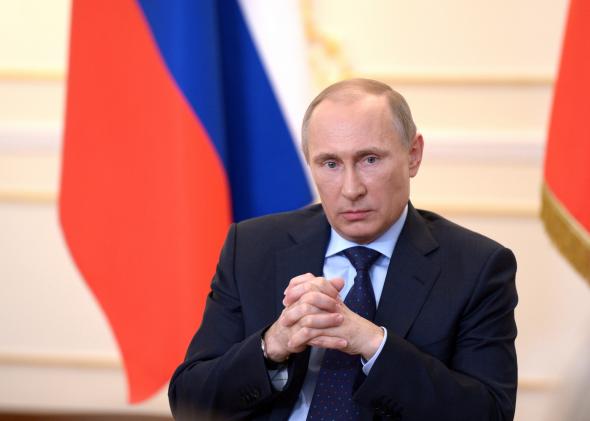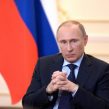
Russia Returns to Strategy of Escalation, Derailing Ukrainian Ceasefire
Publication: Eurasia Daily Monitor Volume: 11 Issue: 113
By:

The peace plan advanced last Friday (June 20) by President Petro Poroshenko aimed to reassert the integrity of the Ukrainian state, yet it may mark a new escalation of hostilities in Donbas—the eastern territory of Ukraine encompassing Donetsk and Luhansk regions. Russian President Vladimir Putin remains faithful to the idea that the Maidan revolution pushed Ukraine to state failure, and any consolidation of Kyiv’s control over Donetsk and Luhansk would undermine this narrative (Moscow Echo, June 20). Poroshenko called Putin twice last week to discuss the plan for pacifying Ukraine’s east, yet the Kremlin immediately denounced this plan as an “ultimatum” to the militia of southeastern Ukraine and criticized Kyiv’s lack of readiness to open negotiations with the rebels (kremlin.ru, June 20).
Putin may have no intentions whatsoever to launch a large-scale military intervention into Ukraine despite the heavy drums of “patriotic” propaganda that have become a self-propelling political force in Russia (Nezavisimaya Gazeta, June 20). Yet, the heavy battle around Sloviansk, where the desperate rebels are determined to hold on to the bitter end, and the recurrent clashes along the border with Russia, which the Ukrainian forces try to keep under control, leave only a slim chance for Poroshenko’s plan to succeed (newtimes.ru, June 16). The separatists are hard pressed, but the growing civilian casualties strengthen their resolution not to lay down their weapons. Meanwhile, Moscow undoubtedly wants to prevent the Russian “volunteers” from retreating to the Rostov or Belgorod oblasts (gazeta.ru, June 20). The deepening humanitarian catastrophe has driven thousands of families to leave their homes, fleeing primarily to other Ukrainian cities, and generates popular demand for a “peace making” operation of some kind (Nezavisimoe Voennoe Obozrenie, June 20). But there is no way of manipulating this localized though deadly civil war at low risk, and Putin had to order the troops of the Central Military District to assume a high combat readiness posture and to deploy some battalions again to the border of Ukraine (RBC Daily, June 19).
The renewed military pressure is combined with the cutting off of natural gas supplies to Ukraine. But so far, Kyiv has resolutely refused to accept Gazprom’s diktat on prices or its demands for Ukraine yielding control over its pipelines. The threat of disrupting Ukraine’s energy security loomed from the very moment of Maidan’s triumph over former president Viktor Yanukovych, who fled to Russia on February 21; thus, it is remarkable that Putin has decided to wield this weapon only now (polit.ru, June 20). One reason is probably that, while it was possible for the Kremlin to dismiss the Ukrainian government as an illegitimate “junta,” presently Putin has a real opponent in Poroshenko with a strong public mandate; so the gas “punishment” is useful for undermining his authority. Another reason is that Putin likely knows that continuing support for Donbas separatists involves a high risk of new sanctions, so he seeks to pre-empt Western moves by maximizing the uncertainty related to gas dependency, knowing that European unity in energy matters is particularly fragile (Novaya Gazeta, June 18).
Poroshenko calculated his peace plan to take effect—and quite predictably to fail due to the doggedness of the rebels—during the week leading up to the European Council summit, where energy relations with Russia will be at the top of the agenda (Ezhednevny Zhurnal, June 20). Putin also seeks to influence this agenda and so has quickly arranged an official visit to Austria, expecting to make Vienna into an advocate not only for the South Stream gas pipeline but also for the inviolability of Russian-European energy ties (RBC Daily, June 18). He counts also on the gradually increasing “Ukraine fatigue” in the West, accentuated by the growing realization of the scope of problems in the economy of this major European state, which the European Union would have a particularly difficult time bankrolling given the depth of Europe’s own financial mess. Meanwhile, Russia’s return to the track of conflict escalation in Ukraine—in parallel with the escalation of violence in Iraq—is perceived as a means to convince US President Barack Obama to more seriously take Moscow’s position into account and to engage in top-level bargaining on strategic stability (Rossiyskaya Gazeta, June 18).
Whatever Putin’s personal idiosyncrasies, it is clear that pro-active engagement with the separatists in Donetsk and Luhansk answers the preferences of the Russian elite groups that have risen in influence during his new presidency and particularly over the course of the Ukrainian crisis (slon.ru, June 16). He has orchestrated several rounds of administrative reshuffling, marginalizing the “liberal” technocrats in the government and promoting a new generation of siloviki (security agency personnel). However, these “young wolves” are not only merciless toward competitors but also eager to prove their loyalty to the “patriotic” cause (grani.ru, June 20). Moreover, they hold no esteem for Gazprom. Rather the siloviki seek to bite off some high-value business “morsels” from this inept energy conglomerate as well as play fast and loose with Gazprom’s gas instruments, disregarding the risk this could bring to Russia’s “national heritage” (newtimes.ru, June 16). Putin still excels in the role of supreme arbiter, but he is finding it increasingly difficult to perform as the “decider” because the patriotic mobilization, which has lifted his approval ratings sky high, also imposes rigid limits on his ability to compromise and achieve a new “normalcy.”
Putin has tried to wash his hands of the separatists’ failure in eastern Ukraine. But these groups have stubbornly refused to accept defeat, turning their rebellion into a tragic battle for a hopeless cause. And Putin has discovered that there is no way to shift the blame for betraying the promise to protect their cause. The Russian-backed fighters in Donbas were supposed to be disposable, but they, instead, have scorned the script and raised the stakes. Consequently, Russia’s game of conflict manipulation has turned into a burdensome engagement with no plausible deniability. Putin cannot afford to be seen as having been outplayed by Poroshenko and would much rather accept responsibility for derailing the peace plan than appear as a loser whose bluff was called. The Russian president probably knows that he cannot win but may find satisfaction in his capacity to do a great deal of harm to everyone all at once.




